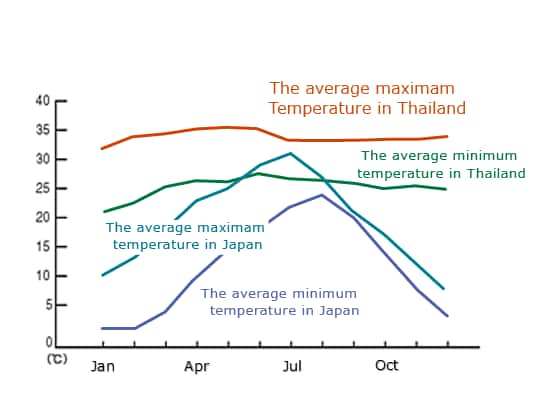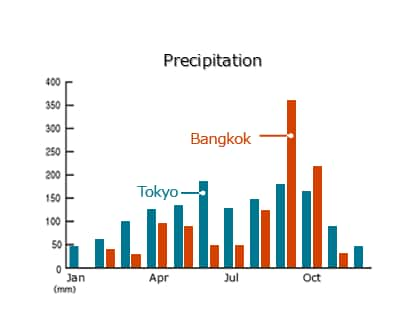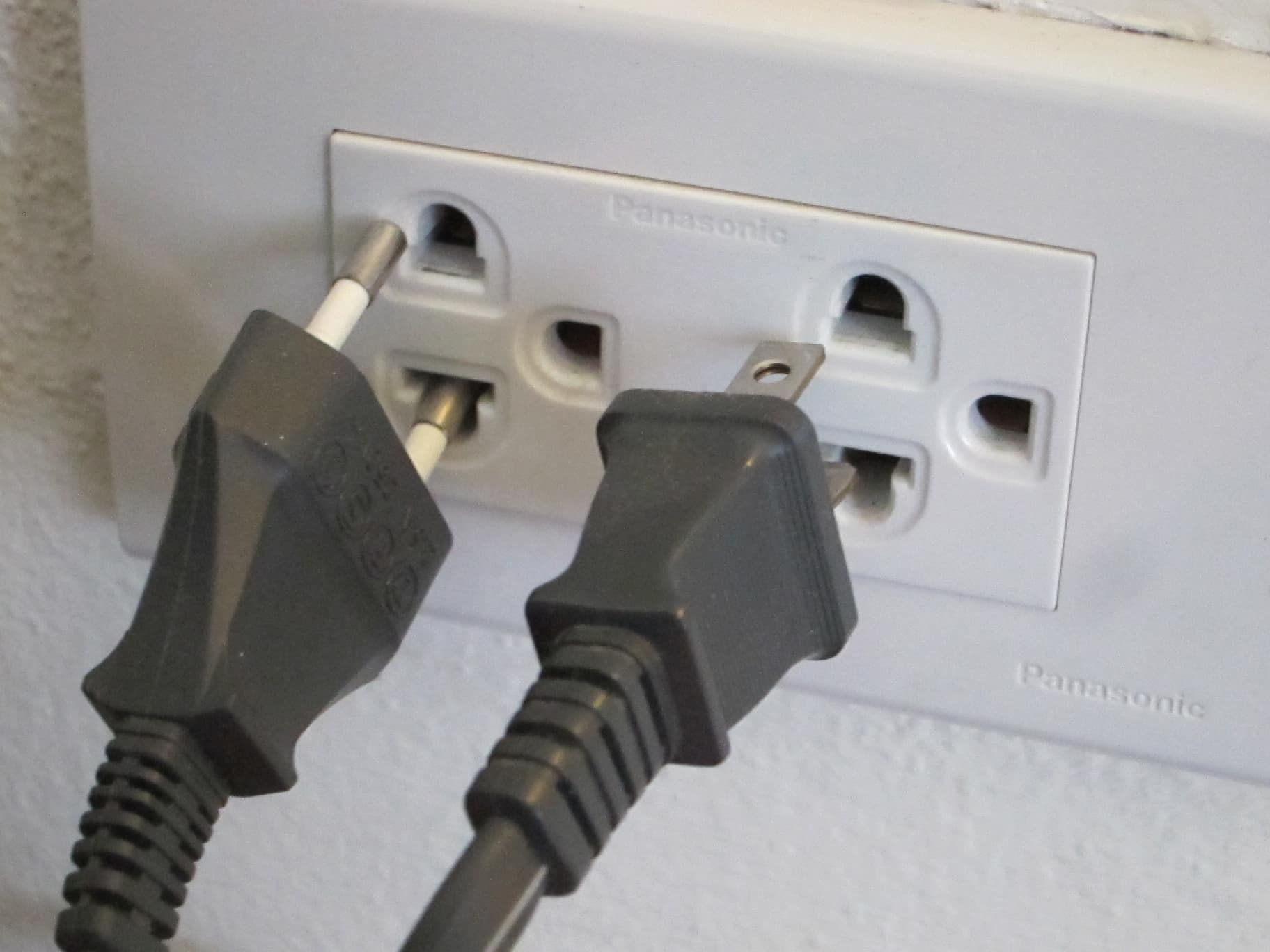- Please select the card you wish to join
-

Get your digital card immediately
No enrollment or annual fees
ANA Mileage Club Card
Earn more miles for your money
With credit function
ANA Card
-
Reservations
-
MILES
-
MILES
-
Login
-
Support
Bangkok
on November 22th, 2024 (JST) current information
Immigration and Visa
Visa
If you are a tourist and have a booked plane ticket to depart within 60 days of entering the country and cash equivalent to 10,000 baht per person (20,000 baht for a family), you can stay for 60 days (59 nights and 60 days) without a visa. If you are staying for a non-tourist purpose, such as a business trip, you will generally need a visa according to your purpose. For more information, please contact the Thai Embassy.
Passport
You may enter if you have a passport that is valid for at least six months from the date of entry.
Quarantine
When visiting from Japan, it is prohibited to bring the following items into Thailand.
- a. Main raw fruit or vegetables
- b. Main plant seeds and all other parts (excluding cigarettes, cut tobacco, and leaf tobacco)
- c. All parts of genetically modified soybeans, corn, sorghum, orchidaceous plants, or other plants
- d. Soil, organic fertilizer, weeds, quarantine pests
- Preserved foods made of plants that have been treated to kill pests and prohibited fresh fruits that are frozen to -17.8°C or lower can be brought in.
Customs
Bringing in e-cigarettes
You are not allowed to bring e-cigarettes (heated tobacco products) into the country and possession in Thailand is illegal.
Documents required at the time of immigration
As of November 11, 2024, no disembarkation/embarkation card is required when visiting by air. As a temporary measure until April 30, 2025, entry by land and sea does not require an entry/exit card.
- Visa, passport, and other information is subject to change without notice. Be sure to check with the Embassy, Consulate, or travel agency.
For bringing and possession of tax-free cigarettes
- Tobacco: Cigarettes 200 pieces, or cigars 250 g
- Alcoholic beverages: 1 bottle (or up to 1 L)
If you are bringing items exceeding the above amounts into Thailand, you must declare the items to customs. Failing to provide such a declaration will result in high monetary penalties. Note that Customs is especially strict on tobacco. Some unfortunate visitors have even been fined for temporarily holding tobacco for their travel companion while they used the restroom, with the extra amount being added on.
Time difference and Daylight Saving Time
Time difference
Thailand is 2 hours behind Japan. When it is noon in Japan, it is 10:00 in Thailand. Daylight saving time is not observed.
Climate
Climate
Thailand is located in the tropics, so it is hot all year round, but the climate in Thailand differs slightly from that in the southern Malay Peninsula, the northern mountain range, and the plateau country in the northeast. There are three seasons: the rainy season, the dry season, and the hot season (classified as the rainy season, the cold season, and the summer season by the Thai Meteorological Department).

Average high temperature and average low temperature in Thailand (Bangkok) and Japan (Tokyo)

Monthly precipitation in Bangkok and Tokyo
-
Monthly average temperature and precipitation
The average maximum temperature in Japan (Tokyo) and Thailand (Bangkok), The average minimum temperature in Japan (Tokyo) and Thailand (Bangkok)
month The average maximum temperature in Japan (Tokyo) The average minimum temperature in Japan (Tokyo) The average maximum temperature in Thailand (Bangkok) The average minimum temperature in Thailand (Bangkok) Jan. 10℃ 2℃ 32℃ 21℃ Feb. 10℃ 2℃ 33℃ 22℃ Mar. 13℃ 5℃ 34℃ 25℃ Apr. 18℃ 10℃ 35℃ 26℃ May 23℃ 15℃ 35℃ 26℃ Jun. 25℃ 18℃ 35℃ 27℃ Jul. 28℃ 23℃ 32℃ 26℃ Aug. 31℃ 24℃ 32℃ 26℃ Sep. 27℃ 21℃ 32℃ 25℃ Oct. 23℃ 15℃ 32℃ 24℃ Nov. 17℃ 10℃ 32℃ 25℃ Dec. 13℃ 5℃ 33℃ 25℃ The average precipitation in Tokyo and Bangkok
month The average precipitation in Tokyo The average precipitation in Bangkok Jan. 50mm 0mm Feb. 60mm 40mm Mar. 110mm 30mm Apr. 130mm 90mm May 130mm 80mm Jun. 180mm 50mm Jul. 130mm 40mm Aug. 150mm 120mm Sep. 180mm 360mm Oct. 160mm 220mm Nov. 90mm 30mm Dec. 50mm 0mm
Currency and Exchange Rate, Tax, Currency exchange, Tip
Currency and Exchange Rate

The unit of currency is the bhat (B), which is subdivided into the satang. B1 is 100 satang. As of June 29, 2024, the exchange rate is 1B, approx. JPY4.37.
Tax
In Thailand, a 7% value added tax (VAT; may increase to 10% in October 2020) is imposed on most products. If conditions are met, the VAT will be refunded, so do not forget to do the paperwork. Taxes imposed on services rendered within Thailand, such as payments for hotel fees and restaurant charges, are not eligible for the refund.
Tip
Just like tipping in Japan, leaving a tip at upscale places is a good idea.
- Hotels: Tip bellhops who carry luggage and room service approx. B40.
- Restaurants: At midrange or higher class restaurants that include a service charge, leaving change from the bill is fine, and when a service charge is not included, tip approx. 10% of the meal charge, up to about B100.
- Taxis: Although tipping taxis is generally not required, fares are low, and drivers are grateful when riders pay a little extra, for example rounding up when there is change.
- Thai Massage: From about B50 to B100 is tipped for an hour and From about B100 to B200 for 2 hours, depending on the level of satisfaction. Smaller in regional areas. Do not be fooled even if an employee indicates that tips are JPY1000. That kind of employee does not merit a tip. From about B200, depending on the grade of the spa.
Voltage and plug
Voltage

Outlet for plugs of various shapes
Voltage is 220V with a cycle of 50Hz. Using electric products from Japan requires a transformer. Plugs are the 2-prong Type A used in Japan, Type BF, Type C, etc.
Video and DVD
Video and DVD
Thailand uses a different television encoding system (PAL) from Japan (NTSC). Products such as DVDs sold in Thailand cannot be played on video players built to Japanese specifications. When watching a DVDs, a region-free multi-player must be used. The DVD region code is 3 (Japan is 2). BD is the same code A used in Japan.
Post Office Business Hours
Though it differs slightly for each post office, usually they are open from Mon. to Fri., 8:30 to 16:30, Sat. 9:00 to 12:00, closed Sun. and holidays. The post office at Suvarnabhumi International Airport is open 24 hours a day, but only carries out mail service.
Postal Fees
Airmail to Japan costs B25 to B30 for a postcard, and B34 for a sealed letter up to 20g. An extra B5 is added for every 10g thereafter.
Phone Call
How to phone
Telephoning Japan from Thailand
Telephoning Japan from Thailand
A range of International Telephone Company numbers are available, 001 etc. The Country Code for Japan is 81.Remove the first 0 for area codes.
International Telephone Company Number (Choose one of the following) 001, 007, 008, 009
81 (Country Code, Japan)
xx(Remove the first 0 for area codes and mobile telephone numbers)
1234-5678 (Other parties telephone number)
Telephoning Thailand from Japan
Telephoning Thailand from Japan
66 (Country Code, Thailand), remove the first 0. Then dial using any of the following.
International Telephone Company No.
- 0033 (NTT Communications)
- 0061 (SoftBank)
010 (International Identification No.) *2
66 (Country Code, Thailand)
1234-5678 (Remove the first 0 for numbers with eight or nine digits)
- Pre-registration to World Wing is required for NTT DoCoMo.
- For the three cell phone carriers, hold down 0 until + appears, then add the country code and the phone number your wish to dial.
Domestic calls from within Thailand
There are no area codes applied when making calls within Thailand. Fixed lines start with 0 for nine digit numbers, and 01 or 06 or 08 or 09 for ten digit mobile telephone numbers. The first 0 is required in front of all numbers regardless of where calls are being made in Thailand.
Holiday / National holiday
Holiday / National holiday
The dates of national holidays observed according to the lunar calendar change each year *1. When a national holiday falls on a Saturday or Sunday, it is observed on the following Monday.Buddhist holidays are designated no alcohol days and it is prohibited to sell or serve alcohol on those days *2.
National holidays in 2025 (year 2568 according to the Buddhist calendar)
- January 1: New Year's Day
- February 12: Makha Bucha Day*1 *2
- April 6: Chakri Day
- April 7: Substitute holiday
- April 13 to 15: Songkran (Thai New Year's) (differs slightly by region)
- April 16: Substitute holiday
- May 1: Labor Day (Only private companies close)
- May 4: Coronation Day
- May 5: Substitute holiday
- May 9: Phutmonkhon(Agricultural Festival. A Thai public holiday observed only by government offices.)
- May 11: Visakha Bucha *1 *2
- May 12: Substitute holiday
- June 2: Thailand Special Public Holidays
- June 3: Queen's Birthday Anniversary
- July 10: Asalha Bucha (On the day of the full moon, usually in July or August)*1 *2
- July 11: Khao Phansa*1 *2
- July 28: King’s Birthday
- August 11: Thailand Special Public Holidays
- August 12: Queen Mother’s Birthday
- October 13: Rama IX Memorial Day (Day of Former King’s Passing)
- October 23: Chulalongkorn Memorial Day
- December 5: National Day (Former King's Birthday)
- December 10: Constitution Day
- December 31: New Year's Eve
- *1.The dates of holidays that follow the lunar calendar change each year. When a public holiday falls on a weekend, Monday is a substitute holiday.
- *2.The sale of alcohol and serving of alcohol at restaurants and other places are prohibited on Buddhist holidays. Consumption of alcohol is not itself prohibited, and you are allowed to drink alcoholic beverages in private places such as your hotel room.
Language
Language
The official language is Thai. English is well-understood in luxury hotels, upscale restaurants, and other places that cater to foreign nationals, and younger people running shops and restaurants can often speak fluently. The level of English understanding is not high in the general population.
Business hours, etc
Business hours
Below are guidelines for general business hours.
Banks
Regular branches are open from 8:30 to 15:30 on weekdays and are closed on weekends and holidays. Branches in shopping malls and other establishments often have the same hours as the establishment and are very convenient.
Department Stores/Shops
Every day around 10:00 to 22:00.
Restaurants
Upscale restaurants close for a time in the afternoon. Some restaurants are only open at night. Food stalls are open from early morning until late at night, so that something is available to eat at anytime.
Convenience Stores
Usually open 24 hours.
Age Limit
Persons under 20 years old cannot purchase or consume alcohol and tobacco.
Manners
Ban on Littering
Bangkok and other cities in Thailand impose a maximum legal fine of B2000 on littering and throwing away tobacco in the streets.
Drinking
Restriction on Sale of Alcohol Products
Alcohol can only be sold between 11:00 and 14:00 and between 17:00 and 24:00. Some bars and restaurants do not serve alcohol during the hours when sale is not allowed. However, many small privately-owned places will serve you alcohol outside of the sale hours. Alcohol cannot be sold or served at a bar or restaurant during Buddhist holidays, from 18:00 on the day before an election, and until 24:00 on the day of the election.
Smoking
Non-smoking Law
In Thailand, smoking is prohibited primarily in following public spaces and within 5 meters of their entrances.
Non-smoking During Business Hours
- Public transportation (buses, taxis, passenger trains, boats, aircraft, school buses)
- Air-conditioned buildings (waiting rooms for vehicle transport, etc., internet cafés, sports facilities, restaurants, elevators, sales areas, hotel lobbies, night spots such as bars)
- Inside buildings (theaters, libraries, barbers, tailors, beauty salons/esthetic salons/spa facilities, pharmacies, department stores, medical facilities without beds, places of religious ceremony, toilets)
- Other (public harbors, telephone booths)
Schools, city halls, sport facilities, medical facilities, museums, public transport, restaurants, main beaches, etc.
Punishment for Violators
Violators will be fined B2000.
Restriction on Sale of Tobacco Products
Display sale of tobacco products is prohibited, so they are not on display in shops.


